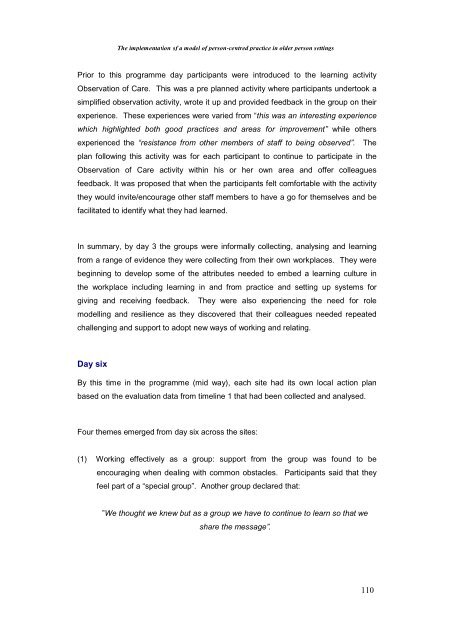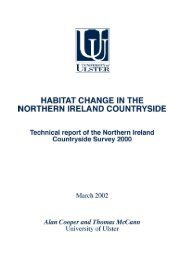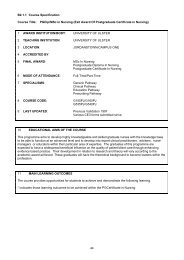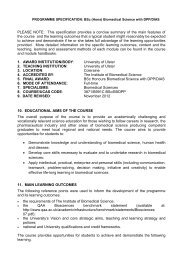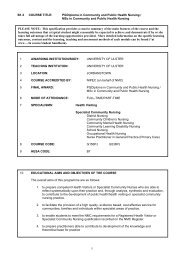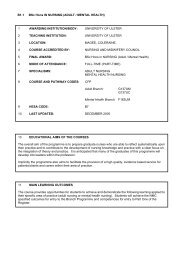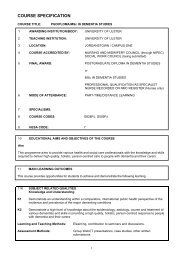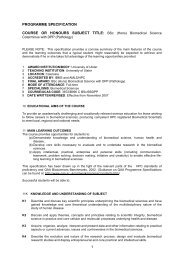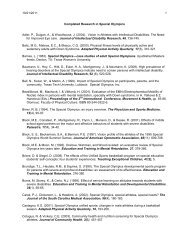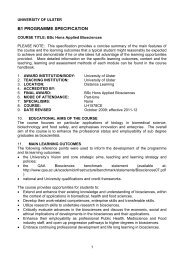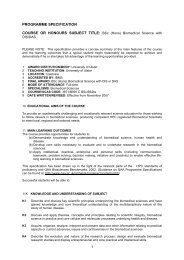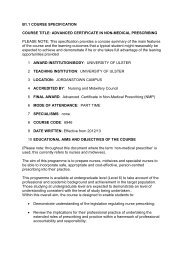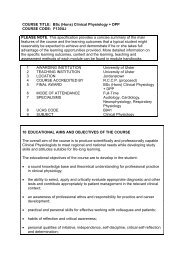The Implementation of a Model of Person-Centred Practice In Older ...
The Implementation of a Model of Person-Centred Practice In Older ...
The Implementation of a Model of Person-Centred Practice In Older ...
Create successful ePaper yourself
Turn your PDF publications into a flip-book with our unique Google optimized e-Paper software.
<strong>The</strong> implementation <strong>of</strong> a model <strong>of</strong> person-centred practice in older person settings<br />
Prior to this programme day participants were introduced to the learning activity<br />
Observation <strong>of</strong> Care. This was a pre planned activity where participants undertook a<br />
simplified observation activity, wrote it up and provided feedback in the group on their<br />
experience. <strong>The</strong>se experiences were varied from “this was an interesting experience<br />
which highlighted both good practices and areas for improvement” while others<br />
experienced the “resistance from other members <strong>of</strong> staff to being observed”. <strong>The</strong><br />
plan following this activity was for each participant to continue to participate in the<br />
Observation <strong>of</strong> Care activity within his or her own area and <strong>of</strong>fer colleagues<br />
feedback. It was proposed that when the participants felt comfortable with the activity<br />
they would invite/encourage other staff members to have a go for themselves and be<br />
facilitated to identify what they had learned.<br />
<strong>In</strong> summary, by day 3 the groups were informally collecting, analysing and learning<br />
from a range <strong>of</strong> evidence they were collecting from their own workplaces. <strong>The</strong>y were<br />
beginning to develop some <strong>of</strong> the attributes needed to embed a learning culture in<br />
the workplace including learning in and from practice and setting up systems for<br />
giving and receiving feedback. <strong>The</strong>y were also experiencing the need for role<br />
modelling and resilience as they discovered that their colleagues needed repeated<br />
challenging and support to adopt new ways <strong>of</strong> working and relating.<br />
Day six<br />
By this time in the programme (mid way), each site had its own local action plan<br />
based on the evaluation data from timeline 1 that had been collected and analysed.<br />
Four themes emerged from day six across the sites:<br />
(1) Working effectively as a group: support from the group was found to be<br />
encouraging when dealing with common obstacles. Participants said that they<br />
feel part <strong>of</strong> a “special group”. Another group declared that:<br />
”We thought we knew but as a group we have to continue to learn so that we<br />
share the message”.<br />
110


